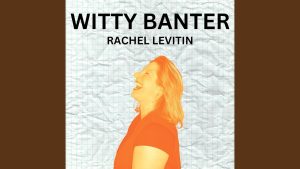
Witty Banter is One for the Books
Recent Articles March 21st. A day that I will always think of amazing album releases. DC-based musician, producer, and singer-songwriter, Rachel Levitin, released Witty Banter

by Molly Guillermo
Washington, D.C. is the culturally notable home of Mumbo sauce, the 2019 World Series champs, and Go-Go music, a genre that blends hip-hop, funk, and Afro-Latin beats with constant percussion. Its name is a reference to both a Smokey Robinson and The Miracles song and DC legend Chuck Brown’s lack of breaks between sets so he could keep the music going. And now, it will keep going, thanks to the Washingtonians who are dedicated to preserving its legacy.
The genre has gained the attention of local and national news outlets recently, serving as a symbol for the cultural identity predominantly black neighborhoods in the District are fighting to protect. Though gentrification in Washington has been occurring for decades, one particular controversy has sparked an ongoing movement to fight the neighborhood revitalization that drives up rents and displaces low-income communities.
Donald Campbell, owner of Central Communications, a record store and cell-phone carrier located in Shaw, near the street historically known as the Black Broadway, found himself being pressured by the newly constructed neighboring condos to stop playing Go-Go music outside his store. The new neighbors, followed by T-Mobile, pressured the city to make him turn off his music. A petition was formed by Campbell’s friend, Ronald Moten, to fight back, and the petition gained traction. With over 80,000 signatures, the hashtag #Dontmutedc shortly followed, and a movement began. Community organizing, rallies, and the widely attended street event and demonstration Moechella, proved that “cultural genocide” would not take place without a fight.
Go-Go music was saved for Campbell and his store thanks to Don’t Mute DC, but the preservation and district-wide recognition of DC’s indigenous musical genre is in question. On October 30th, activists, musicians, scholars, and politicians testified before City Council on behalf of Bill 23-317 to make Go-Go music the official genre of DC. On the day of the hearing, I spoke with Tone P, two-time gold artist, producer, activist, songwriter, and lifelong DC resident about gentrification, cultural identity, and how music is a form of activism.
Why is it important to make Go-Go music the official genre of DC?
Tone P : Go-Go raised me, it was my sense of community. It’s touched so many musicians. And it was created right here in DC. Present day, it’s the staple sound of DC…It’s community, it’s power, our power. This legislation should have happened years ago. That kind of history should be at the forefront of DC tourism and has been overshadowed by the political arena. It’s about time our genre and community as a whole be recognized.
Do you consider your workshop Trap Bounce, which teaches children how to write their own lyrics, rap, and make music, to be part of your activism?
Go-Go has been struggling, surviving. It hasn’t been at the forefront of culture as the city has been changing. So I [started Trap Bounce] five years ago. I was approached by the non-profit Do The Right Thing, and they offered me a position. It was my opportunity to start a program for kids…These days they’re into rap, trap…So I wanted to capture that, along with Go-Go, which is something I’ve been doing since the beginning of my career, when I was producing tracks for Wale. It keeps our genre on the forefront of youth [culture] and a part of our identity in DC. We’ve never really followed the footsteps of any other genre. We’ve respected and admired other genres, but we have always done our own thing in DC.
〈Trap Bounce〉 is a huge part of my activism. The baseline is character development. A lot of things, a lot of resources, are unavailable to us in the inner city. In any section 8 environment, black environments in particular, our resources are based on the tax dollars in our neighborhood. And if everyone’s in subsidized housing, that speaks for itself. So we can’t have the best schooling and the best opportunities. And from that you develop characteristics from the lack of resources, and I wanted to use music to teach kids how to work together, even with people they don’t want to work with.
What does the city today look like compared to the one of your childhood?
It’s much different. DC was pretty scary in the ‘90s. And that’s because the crack epidemic in the ‘80s and ‘90s that left the city in shambles. It drove the property value down; a lot of people left the city to take care of themselves. So there were a lot of dilapidated buildings, a lot of poverty in the city. Nobody knew crack would create the outcomes it did, so it left generations of kids raising themselves. A lot of fathers in jail. For me, growing up, I was living on Georgia Ave. and we moved to the Southwest (SW) when I was ten. We left the SW because a bullet flew through my window, but it was just all my family [was] in the SW.
Gentrification is a double-edged sword. It’s terrible to see people displaced…but you have to understand that in life, it’s not a black and white conversation. It’s an economic conversation. Things are always changing. Things change, and you can’t complain. Even if it’s not fair, or if it’s wrong. If you mind your P’s and Q’s, if you educate yourself, if you want to have the tools to be a smart person, you will be less affected by gentrification. It’s a huge word, especially to African Americans, because we all know African Americans aren’t granted the same opportunities as everyone else. But if you step outside of that, gentrification is really just developers or investors coming into an area and looking for profit, which is wrong and right at the same time. My advice is to get out of the ghetto…When the government is paying your rent, you start to feel like the government should be paying your rent, and you start to get used to the convenience of it all.
We have to be smarter, more current. I went to school in Georgetown, even though I was living in the SW; my mother used my cousin’s address. I was given a better education, which is why I can speak articulately. I thought differently, I saw things differently. I was exposed to a different world. We, the people who have more opportunities, have the responsibility to uplift those who don’t. So gentrification is just a part of that; I don’t think it’s a bad thing, I think it’s a great thing. We have the Nationals Park in the SW…When I used to walk through there, it was nothing but a McDonald’s and a car wash. But now it’s a Marriott, developments, the Marine site. It’s all cool, in my opinion. But again, at what cost? It’s a double-edged sword.
One of the most well-known stories about gentrification is the mobile phone store having to silence their Go-Go music, but what other stories do you think need to be told?
Stories are being told as we speak. It’s all happening…We have ignited a movement. People are speaking up, using the hashtag #Dontmutedc. If you have something to say, to contribute to the movement, the time is now. If we get this bill passed, this will be a conclusion to a historic event. Go-Go was created in DC. I believe we can do what Nashville did with the country music genre. When you invest in your culture, you invest in your city.

Based in DC by way of San Francisco, Molly originally hails from southern California and has a background in English. She aims to explore music’s inextricable tie to pop culture and its evolving relationship with politics.

Recent Articles March 21st. A day that I will always think of amazing album releases. DC-based musician, producer, and singer-songwriter, Rachel Levitin, released Witty Banter

Alchemical Records is a Washington, D.C. based music publication. We cover the Washington, D.C., Baltimore and Richmond, VA metro area music scenes, including band interviews, articles about your favorite musicians, new music and concert dates.